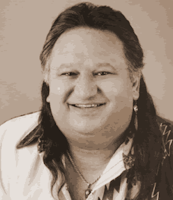Emily Finton
ef385214@ohio.eduIn the front of a room almost full to capacity sat Richie Plass, with his shining gold jacket and a large smile on his face. He warned the audience when he started of not only his sarcastic humor, but also the controversial topics he was about to cover from events in his life as an Menominee and Stockbridge-Munsee Indian. Plass drove all the way from Wisconsin and travels the United States to spread awareness of how the media portrays Native Americans, if they do at all.
 |
| Photo of Richie Plass (courtesy of Google images) |
Telling his story starting from his childhood, he explains that being Indian has always brought him attention, positive and negative.
He attended Catholic school on his reservation, but moved around to different schools during his education. He was one of few Indians to attend a school off of his reservation in Wisconsin, and his high school publicized that. In the winter of 1968, he refused several times the chance to lead his school's basketball team out during their game. This was an automatic suggestion to me of how he has lived in a society that doesn't completely recognize cultural differences.
He wasn't treated differently in a school that he was a minority of until that certain basketball season. He was begged by the faculty of his school to lead their team out, but Richie didn't want to appropriate his tribe for the entertainment of one gymnasium. As only a teenager, he made a mature decision to go to the chief of his reservation and ask what he should do. His chief told him "if they want a Hollywood Indian, give it to them. Just don't wear traditional clothing."
His Indian costume came from a tacky costume store and was made in Japan. He escorted the basketball team on to their home court, which then over the course of the season led to him being their half-time show. The audience loved him, even the people from his reservation started to attend games to watch him dance. He had so much attention that the local newspaper wanted him to perform at an away game. This is where his troubles began.
After arguing against performing at the away game, Richie finally gave in. He traveled with the team, and when the time came he ran on the away team's court to perform. Instead of his usual applause, he was mocked and laughed at by the crowd. Paper cups, orange and banana peels were thrown at him. People from the top of the bleachers spit on him. He ran to the locker room and said to the coach "God damn it, I told you. I didn't want to do this stuff."
This was one of his first negative experiences living in a white society as an Indian man, and what helped motivate him to start advocating. He does several lectures, and he makes them easily accessible to find online here.
When he did his first event as a guest speaker at the Wisconsin Teacher's Convention in 1970, he was asked how to properly teach Indian children. This sparked his interest in education, which led to him leading Native American studies at Kent State. After living in Ohio, his focus narrowed with the representation of Indians through logos, specifically Chief Wahoo of the Cleveland Indians.
He wrote to the department head of the Cleveland Indians three separate times respectfully asking why they would choose a smiling Indian as their logo, one that doesn't even look like them? After the third letter, where Plass asked if only 1% of the profits made off of the apparel with Chief Wahoo on it could be put in an account for Native American students living in Cleveland to attend college, they finally wrote back and said no. This is one aspect of Indian culture as a mascot that the media has brought to the public because of how outrageous it is. Unfortunately, it seems as if the Cleveland Indians do not want to cooperate.
No comments:
Post a Comment